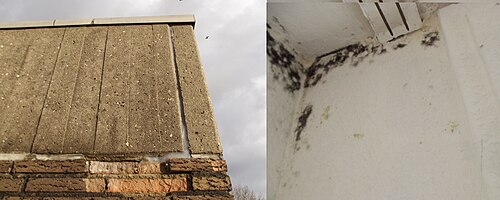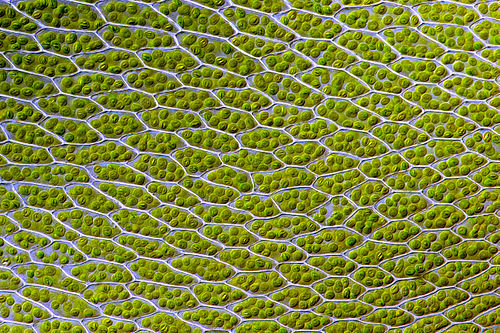Moldnoun
A hollow form or matrix for shaping a fluid or plastic substance.
Moldnoun
A frame or model around or on which something is formed or shaped.
Moldnoun
Something that is made in or shaped on a mold.
Moldnoun
The shape or pattern of a mold.
Moldnoun
General shape or form.
Moldnoun
Distinctive character or type.
Moldnoun
A fixed or restrictive pattern or form.
Moldnoun
(architecture) A group of moldings.
Moldnoun
(anatomy) A fontanelle.
Moldnoun
A natural substance in the form of a woolly or furry growth of tiny fungi that appears when organic material lies for a long time exposed to (usually warm and moist) air.
Moldnoun
Loose friable soil, rich in humus and fit for planting.
Moldnoun
Earth, ground.
Moldverb
(transitive) To shape in or on a mold.
Moldverb
(transitive) To form into a particular shape; to give shape to.
Moldverb
(transitive) To guide or determine the growth or development of; influence
Moldverb
(transitive) To fit closely by following the contours of.
Moldverb
(transitive) To make a mold of or from (molten metal, for example) before casting.
Moldverb
(transitive) To ornament with moldings.
Moldverb
(intransitive) To be shaped in or as if in a mold.
Moldverb
(transitive) To cause to become moldy; to cause mold to grow upon.
Moldverb
(intransitive) To become moldy; to be covered or filled, in whole or in part, with a mold.
Moldverb
To cover with mold or soil.
Moldnoun
A spot; a blemish; a mole.
Moldnoun
Crumbling, soft, friable earth; esp., earth containing the remains or constituents of organic matter, and suited to the growth of plants; soil.
Moldnoun
Earthy material; the matter of which anything is formed; composing substance; material.
Moldnoun
A growth of minute fungi of various kinds, esp. those of the great groups Hyphomycetes, and Physomycetes, forming on damp or decaying organic matter.
Moldnoun
The matrix, or cavity, in which anything is shaped, and from which it takes its form; also, the body or mass containing the cavity; as, a sand mold; a jelly mold.
Moldnoun
That on which, or in accordance with which, anything is modeled or formed; anything which serves to regulate the size, form, etc., as the pattern or templet used by a shipbuilder, carpenter, or mason.
Moldnoun
Cast; form; shape; character.
Moldnoun
A group of moldings; as, the arch mold of a porch or doorway; the pier mold of a Gothic pier, meaning the whole profile, section, or combination of parts.
Moldnoun
A fontanel.
Moldnoun
A frame with a wire cloth bottom, on which the pump is drained to form a sheet, in making paper by hand.
Moldverb
To cover with mold or soil.
Moldverb
To cause to become moldy; to cause mold to grow upon.
Moldverb
To become moldy; to be covered or filled, in whole or in part, with a mold.
Moldverb
To form into a particular shape; to shape; to model; to fashion.
Moldverb
To ornament by molding or carving the material of; as, a molded window jamb.
Moldverb
To knead; as, to mold dough or bread.
Moldverb
To form a mold of, as in sand, in which a casting may be made.
Moldnoun
the distinctive form in which a thing is made;
Moldnoun
container into which liquid is poured to create a given shape when it hardens
Moldnoun
loose soil rich in organic matter
Moldnoun
the process of becoming mildewed
Moldnoun
a fungus that produces a superficial growth on various kinds of damp or decaying organic matter
Moldnoun
sculpture produced by molding
Moldverb
form in clay, wax, etc;
Moldverb
become moldy; spoil due to humidity;
Moldverb
form by pouring (e.g., wax or hot metal) into a cast or mold;
Moldverb
make something, usually for a specific function;
Moldverb
fit tightly, follow the contours of;
Moldverb
shape or influence; give direction to;
Moldnoun
a town in north-eastern Wales, administrative centre of Flintshire; population 10,500 (est. 2009).
Mold
A mold (US) or mould (UK, NZ, AU, ZA, IN, CA, IE) is a fungus that grows in the form of multicellular filaments called hyphae. In contrast, fungi that can adopt a single-celled growth habit are called yeasts.
Mossnoun
Any of various small, green, seedless plants growing on the ground or on the surfaces of trees, stones, etc.; now specifically, a plant of the phylum Bryophyta (formerly division Musci).
Mossnoun
(countable) A kind or species of such plants.
Mossnoun
(informal) Any alga, lichen, bryophyte, or other plant of seemingly simple structure.
Mossnoun
A bog; a fen.
Mossverb
(intransitive) To become covered with moss.
Mossverb
(transitive) To cover (something) with moss.
Mossnoun
A cryptogamous plant of a cellular structure, with distinct stem and simple leaves. The fruit is a small capsule usually opening by an apical lid, and so discharging the spores. There are many species, collectively termed Musci, growing on the earth, on rocks, and trunks of trees, etc., and a few in running water.
Mossnoun
A bog; a morass; a place containing peat; as, the mosses of the Scottish border.
Mossverb
To cover or overgrow with moss.
Mossnoun
tiny leafy-stemmed flowerless plants
Mossnoun
a small flowerless green plant which lacks true roots, growing in low carpets or rounded cushions in damp habitats and reproducing by means of spores released from stalked capsules
Mossnoun
used in names of algae, lichens, and higher plants resembling moss, e.g. reindeer moss, Ceylon moss, Spanish moss.
Mossnoun
a green colour like that of moss.
Mossnoun
a bog, especially a peat bog.
Mossverb
cover with moss
Moss
Mosses are small, non-vascular flowerless plants in the taxonomic division Bryophyta (, ) sensu stricto. However, Bryophyta (sensu lato, Schimp.


























